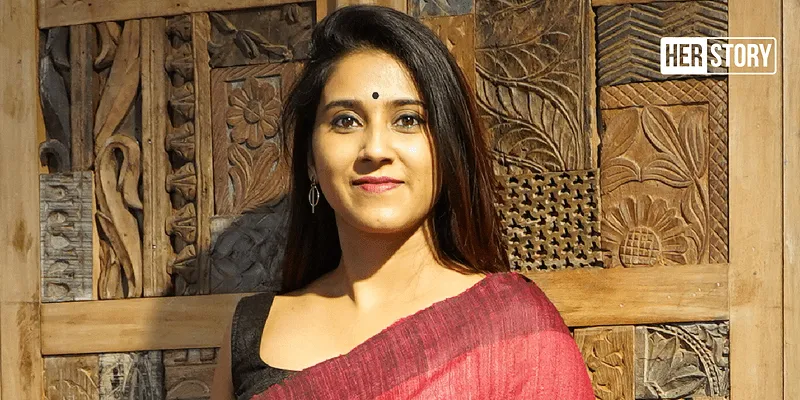How this Pune-based handcrafted saree startup grew from Rs 30 lakh to Rs 12 Cr in 3 years
Founded in July 2017 by husband-wife duo Pallavi Mohadikar Patwari and Dr Amol Patwari, Karagiri claims to have grown 150 percent organically every year. The startup is on track to generate Rs 20 crore revenue for the current financial year.
Started with an investment of Rs 3 lakh to promote skilled artisans and weavers from corners of India, handcrafted saree brand has, for the financial year 2019, achieved a growth revenue of Rs 12 crore, 400 times the initial invested amount.
The startup had generated Rs 30 lakh and Rs 75 lakh in revenues in the fiscal year 2017 and 2018, respectively.
Over the years, the Pune-based brand has expanded its product range from 40 SKUs in 2017 to 10,000 SKUs as of today to provide a complete range of exclusive sarees.
“To achieve this kind of growth, I travelled to a number of places to find the best weavers of India and connected these amazing “magicians” to saree lovers. We started with five weavers in Maharashtra, and now we have over 1,500 weavers across India. We paid a great deal of attention to the product quality, unique designs, and customer experience. Our repeat purchase rate is 32 percent, which says a lot,” says Pallavi Mohadikar Patwari, Co-founder, Karagiri.
The startup claims to has served around 20,000 orders in 2019, with an average order value of Rs 5,900.

Pallavi Mohadikar Patwari, Co-founder, Karagiri
“We have sold around 50,000 units in the financial year of 2019. We have shipped to 11 countries till date, and our main target market is the US and Dubai. Around 40 percent of our orders are international orders,” adds 31-year-old Pallavi.
Apart from selling on its website, Karagiri has an exclusive retail showroom in the Koregaon Park area in Pune that contributes to around 15 percent of the total revenue generated. The firm caters to customers across 11 countries including India, the US, the UK, Dubai, Australia, Singapore, Canada, UAE, Malaysia, and the Netherlands, among others.
The journey
Speaking about both her inspiration to start Karagiri and her experience in scaling the brand, Pallavi says:
“My grandfather was a weaver of Tussar (Kosa) silk sarees, so the perception of high-quality sarees was ingrained in my genes. Since my family was not very well off, it was difficult for them to take care of my expenses when I joined IIM-Lucknow. So, along with my studies, I started sourcing chikankari sarees (Lucknow special hand embroidery) and selling them on eBay to take care of my day-to-day as well as education expenses. This experience jump-started my journey as an entrepreneur.”
Pallavi worked with companies like TATA and Goldman Sachs before starting up.
Initially, there was a lot of scepticism regarding her choice to quit a well-paying job at an investment bank to start up, from both friends and family.
“I decided to take a leap of faith and started working as a marketing consultant and helped them take their brands to a level they never dreamed of before. After a few years of gaining experience, I was confident enough to invest my hard-earned money in my own business,” she adds.
“We are building a growing community of women who love Indian culture, traditions and fashion,” says Pallavi.
Her husband, Dr Amol Patwari, who is the Co-founder, is an orthopaedic surgeon.

Karagiri Co-founders: Pallavi Mohadikar Patwari and Dr Amol Patwari
Looking forward
Launched in July 2017 by husband-wife duo Dr Amol Patwari and Pallavi Mohadikar Patwari, Karagiri is focussing on both revenue and marketing growth in domestic as well as international markets. The startup is planning to deliver around one lakh orders this year in spite of the pandemic and the unprecedented situation following the lockdown.
“Every day, we onboard new weavers and are planning to create a family of 5,000 weavers by the end of this year to provide a wide collection of exclusive and one- of- its- kind sarees to our customers,” Pallavi says.
“We are also on track to generate a revenue of Rs 20 crore for the current financial year, Rs 50 crore in the year 2021 and Rs 150 crore in the year 2022,” she adds.
Karagiri will also be a clothing range for men at a new showroom to be inaugurated this month.
Challenges and growth factor
Like most startups, Karagiri had its own set of challenges.
Pallavi explains, “Most of the challenges we faced during the initial phase was on the operations side, where both of us ended up doing everything from marketing, packaging sarees, and shipping them to attending all customer queries from our living room. Another challenge was to reach out to the weavers who were based in remote rural areas of India, which meant ensuring timely delivery was a big challenge.”
Since the ethnic wear segment is a customer-oriented industry, Karagiri, according to Pallavi, focusses only on the needs of the customer and works out immediate actions based on every feedback from the customer to make the user experience better than before.
“It is all topped up with great product quality and exclusive designs, which distinguishes us from other players in the market. Presently, we cater to customers from 11 countries and our client list also includes many celebrities. The royal family of Malaysia is also a Karagiri customer and the Tunku Soraya admires our sarees so much that when she was visiting India, she made a point to meet me personally,” says Pallavi.
Karagiri, which currently hosts around 25 different saree specialities from different parts of India, aims to be a one-stop platform for saree shopping.
Edited by Rekha Balakrishnan








